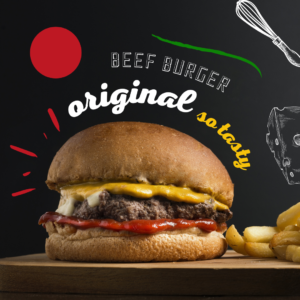VEGAN MYTH BUSTED—HOW MUCH PROTEIN DO YOU NEED?
Written by JaQueen McNair, PMP on March 10, 2021
I know you’ve heard the saying, “Vegans don’t get enough protein,” and you’re not alone. Many people have concerns about embarking on a plant-based vegan diet. They believe they will lose muscle, gain unwanted weight, and develop health issues from carbs. But these concerns aren’t backed by science. Plant-based diet myths come from confusion about nutrition.
To dispel those myths, we will break down:
- the science behind macro nutrients—protein, carbs, and fats
- how much protein you need
- the dangers of protein obsession and food propaganda
THE SCIENCE BEHIND MACROS
To understand how plants can help you build muscle and lose fat, you must know the science behind carbs, fats, and where protein comes from.
Protein’s Role in The Body
Protein is a vital nutrient needed to develop new tissue in the body, such as bone, hair, and skin. And its origin? The soil. A Stanford University study details that soil organic matter contains nitrogen primarily as protein which is the sole source of protein for microbes and animals. Plants use this protein as a nitrogen source to grow.
Additionally, the U.S. National Library of Medicine details that animal products are not the only sources of protein. The study affirms that protein is found in all plants—fruits, vegetables, nuts, seeds, beans, legumes, and grains. As a result, the animals you eat to get your protein got their protein by eating plants. Eating an animal to get protein—or any of earth’s nutrients—is unnecessary when you live in a society where plants are cheap and accessible. For this reason, vegans choose to get protein directly from plants and do not consume any animal products, including eggs and dairy.
Once consumed, regardless of the source, protein gets broken down into amino acids. In muscle building, there are three key amino acids called Branch Chain Amino Acids (BCAAs). These BCAAs are:
- Lysine
- Isoleucine
- Valine
Do our bodies store this protein? No. After breaking down into amino acids, the body uses what it needs and gets rid of the rest. Research from University of Nottingham explains some excess protein gets stored as fat, and the remaining amino acids are flushed out of the body as urea—through feces and urine—returning to the ground.
Now that we understand protein, we can discuss how carbs and fats are used in the body.
Carbs vs. Fats
We are constantly told that carbs are bad. The keto and muscle-building crowds preach, “Animal protein and fat is the healthiest way to build muscle and lose weight.” Back in the 90s, the wave was low fat diets. The new wave is low carb diets. Unfortunately, these misinformation campaigns are inaccurate and dangerous. They don’t teach the dangers of eating animal fat vs plant-based fat, and they ignore the essential role carbohydrates play in the body.
The National Library of Medicine explains that out of the three macronutrients, carbs are the primary source the human body uses for energy. Using fat is more complicated. Carbs break down into two molecules—glucose & fructose—at roughly a 50/50 split.
As for fats, Cleveland Clinic tells us that fats breaks down into a chain of at least three molecules called triglycerides. As a result, like Livestrong Nutrition explains, the body takes the path of least resistance to get its energy up front–through carbs. Carbohydrates are a necessary nutrient.
The popular bodybuilding website Bodybuilding.com has several articles explaining the role of carbs in muscle building. They admit carbs give your body its upfront energy for exercise, strength training, and thinking. And since carbs are the fuel that power the body and brain, half of your food intake should come from carbohydrates.
Carbs give us fuel by supplying our glycogen storages. For this reason, eating low carb long term is bad for muscle building. Without enough available glucose, the body will breakdown muscle proteins to feed its demand for glucose in a process called gluconeogenesis. Lack of carbs limit muscle growth and creates mental and physical fatigue. Fatigue ruins our ability to sleep, workout, gain muscle, increases anxiety, and stress. These issues factor into ruining your chances to:
- build muscle
- reduce body fat
- maintain weight loss
Carbs have been given a bad reputation by being associated with junk food. Pastries, donuts, cakes, and chips are not plant based natural carbs. These items are mostly fat and no fiber. Referring to edible junk food as “carbs” is a false equivalency and invalid.
With thousands of studies like those referenced by Everyday Health, carbs are the body’s main source of energy while fat is used primarily at rest and while we sleep. Fat is essential for things like recovery and hormone regulation. But consuming animal-based fat results in raising bad cholesterol and lowering inake of quality carbs and protein according to research by Cleveland Clinic.
Eating animal fat increases risk for heart disease—this includes eating animal butter, cheese, and eggs. This fact even makes a vegetarian diet dangerous. Eating animal products is the least effective or healthy way to build muscle and lose fat. The best way is eating a plant-based vegan diet full of protein and carbohydrate-packed plants that give energy, reduce body fat, and regulate cholesterol.
How Carbs and Fats are stored in the Body
Carbs are stored in the human body as glycogen (stored glucose) in the muscles, brain, spine, and liver. They make our muscles look fuller and give us that curvy fit or defined physique we seek in fitness. The body stores fat in the liver, subcutaneously (underneath your skin), attached to your organs (visceral fat), and inside muscle tissue.
Despite the science, many believe false claims that eating high carb foods like fruit and grains causes Type 2 Diabetes—one of the paths to preventable heart conditions. To resolve this misinformation, we must understand what Type 2 Diabetes is.
If we’re storing too much fat inside and around muscle tissue and organs, it creates insulin resistance, leading to Type 2 Diabetes, high blood pressure, and heart issues. According to The American Journal of Physiology, insulin resistance means there is too much fat covering muscle tissue and blocking glucose from being absorbed into the muscle for energy. As a result, the glucose piles up in the bloodstream creating health conditions.
When the body recognizes that our muscles didn’t absorb glucose and create energy, it sends insulin in response. The result is called Type 2 Diabetes. Type 2 Diabetes is a conditional result of fat being stored in the liver and muscle tissue due to overconsumption of fatty processed junk food. Following to conclusion, more fat develops on our organs as a protective layer against glucose still floating in the blood stream. This fat buildup on vital organs (visceral fat) ultimately leads to heart conditions. A plant based vegan diet is the healthiest way to reversal of these food-related conditions.
HOW MUCH PROTEIN DO YOU NEED?
Now that we understand the science behind macros, we can discover how much protein we require and discuss its over-estimation and over-consumption.
Protein Wasting—The Over-Estimation
Ask your friends and family how much protein they require, and the answers will shock you. Most Americans believe a 200lb male should consume 200g of protein per day—and they’re wrong. Your protein requirement isn’t based on overall body weight. Instead, it’s based on lean body mass.
Lean body mass is the overall weight of bones, organs, and muscle tissue. This weight does not include body fat. You only require 1g of protein per kilogram of lean mass unless you’re an advanced professional athlete. And according to the NCAA, NAIA, and Bleacher Report, less than 1% of the population are professional athletes.
In 2005, a study by the Institute of Medicine outlined that your body only needs 1 to 1.8 grams of protein per Kilogram of lean body mass—not your entire body weight. How close you are to the 1.8x depends on your fitness level and how close you are to your peak genetic potential. If you are a beginner, 1g of protein per 1 kilogram of lean mass is plenty. But if you are an elite professional athlete who’s been training your muscle professionally for years to peak genetic potential, only then would you consume a target of 1.6 -1.8g of protein per kilogram of lean mass.
The formula is thus:
Your protein daily requirement = Your body weight in kilograms X 1.
According to the Centers for Disease Control and Livestrong, the average American male aged 20 and up weighs about 200 lbs. Their average lean body mass percentage is 80%. Accordingly, the average male carries 160lbs of lean body mass and 40lbs of fat.
Let’s do the math.
To calculate daily protein requirement, do the following:
Body weight: 200lbs
Lean mass weight: 160lbs
Lean mass weight in Kilograms: 160 ÷ 2.2 = 72 Kilograms
Protein Requirement: 1 X 72kg = 72kg
The average American male’s daily protein requirement is 72g.
Protein Wasting—The Over-Consumption
Now that we know the math, we can make sense of the myth. If the average 200lb 20-year-old male consumes 200g of protein per day, his body will only use 72g of protein and eliminate 128g thru his feces and urine. Eating 128 extra grams of protein for no reason is called protein wasting, and it is happening every day. The American Society for Nutrition tells us consistent overconsumption of protein can potentially lead to kidney impairment, several clinical conditions, dehydration, diarrhea, and more because your kidneys can only process so much protein at a time. Furthermore, your body will pack on the extra calories from eating the excess food.
Hundreds of millions buy protein shakes, powders, bars, and supplements, wasting time and money. In addition, we’re adding processed fatty foods into our diet from these refined-proteins and increasing our risk for heart conditions. Since the body will turn those substances into glucose anyway, why not get glucose from natural fruits, vegetables, legumes, nuts, grains, and seeds?
When consuming plants, you’re not just getting glucose. Plants give you:
- antioxidants
- enzymes
- probiotics
- prebiotics
- vitamins
- essential minerals
Those are what your body needs to optimize health, recovery, and muscle building. The Centers for Disease Control tell us that eating fruits and vegetables reduce the risk of several cancers and chronic diseases. Cleveland Clinic further explains that a plant-based diet leads to disease reversal. Therefore, to be smart about fitness and health, adding plants is a better diet strategy than increasing refined protein-packed items. More doesn’t always equal better.
WHY ARE WE SO OBSESSED WITH EATING MORE PROTEIN?
Blame our protein obsession on the billion-dollar media campaigns used to support the dairy & animal agriculture industry since the mid-1900s as a way to boost the economy. For this reason, the “Percent of U.S. Recommended Daily Allowance” protein listed on packaged items is intentionally misleading.
Food Propaganda
The National Cattlemen’s Beef Association, The National Pork Board, and the National Chicken Council together with powerful meat companies like Tyson Foods and JBS, spend billions of dollars so that we never lose our desire for animal protein, according to data collected by Salon. Data from The Federal Trade Commission shows that we are exposed to almost 4000 ads per day. By watching television, children are exposed to five fast-food ads per day, and food companies spend less than 1% of marketing budgets to promote fruits and veggies to kids.
Unfortunately, it doesn’t stop with ads. This same data shows that the meat industry specifically aims to hook children on burgers and drumsticks. They even created the “beef education” curriculums for K–12 classes and got animal products added to the food pyramids in classrooms for generations. They target Millennials born between the 1980s and early 2000s by encouraging them to eat more animal burgers, birds, and steaks, and posting recipe videos and picture ads on Facebook, Instagram, Snapchat, Twitter, and Pinterest to show off “delicious” animal-based meals.
We all know the slogan, “Beef. It’s what’s for dinner.” Millions are spent to make you want to eat meat, and a Salon article further admits that campaigns are forbidden to use images that look like animals. This prevents people from associating their food with the being, feeling remorse, and showing compassion. These campaigns continue to exist because (1) they are large and (2), according to Cornell Law, a U.S. Supreme Court case determined they are considered “government speech.” You read that right. These ads are not just marketing campaigns—they’re backed by government.
The propaganda is everywhere, but it’s not based on food science. It’s based on what earns money–food addiction. Due to these myths, the average 200lb American thinks they must consume 200g of protein or more daily to build muscle and have energy. What’s worse is many believe they’re fatigued because of protein deficiency—despite never knowing someone who died from a protein deficiency.
Instead of buying natural protein-packed carb-filled plants, our diets mainly consist of unnatural items containing 30 ingredients we can’t pronounce. We eat based on addiction—not health. We buy high protein labeled packaged products, animal cheese, and milk. Our grocery shopping goals are to get enough protein and find things labeled “low fat.” And now, many young adults are living with illnesses our grandparents didn’t have until they were 80.
We eat this way because of food propaganda. And this is not conducive to our health. It is meant to take our money and give it to the market, the doctor, the pharmacy, and the surgeon. But we don’t have to keep falling for it. We can change our lives and save our loved ones with the truth. And the truth is:
- You don’t need as much protein as you’ve been told.
- Good carbs are necessary.
- Carbohydrates give your body its energy upfront.
- Every plant contains protein because protein comes from the soil.
- Over-consumption of junk food is deadly and creates Type 2 Diabetes.
- High consumption of plants is necessary for health and reversal of illness.
- Instead of wasting money and calories on processed supplements, eat more plants.
Last, but not least—you will not lose muscle on a properly executed whole foods plant based vegan diet.
If you found this article helpful and want personalized coaching, click here for a free consultation to join the tribe and achieve the body, health, and life you deserve.
Are there any more plant-based vegan myths you would like for us to bust? Message us at TRIBE BY NOIRE to let us know! And don’t forget to follow us for free vegan fitness, nutrition, and mental wellness tips.
REFERENCES
- Plants Can Use Protein as a Nitrogen Source without Assistance from Other Organisms
- Protein
- Carbohydrates as a Source of Energy
- Why Do Our Bodies Burn Carbohydrates before Fat?
- Triglycerides & Heart Health
- Athletes with Rare Physical Traits
- Protein in Diet
- The Average Lean Body Mass
- Is a Plant Based Diet Right for You
- JOHANNS V. LIVESTOCK MARKETING ASSN. (03-1164) 544 U.S. 550 (2005) 335 F.3d 711
- National Center for Health Statistics-Body Measurements
- How Much Protein Do You Need Every Day?
- Minimum Protein Intake per Lean Mass
- Strength Training Can Help Reduce Insulin Resistance
- Institute of Medicine. 2005. Dietary Reference Intakes for Energy, Carbohydrate, Fiber, Fat, Fatty Acids, Cholesterol, Protein, and Amino Acids. Washington, DC: The National Academies Press.
- Food Ads Make Us Eat More and Should Be Regulated
- This is Why You Crave Beef: Inside Secrets of Big Meats Billion Dollar Ad and Lobbying Campaigns
- The Truth about Carbohydrates
Tribe By Noire

I’ve created this platform to help you become the most powerful version of yourself through fitness, plant based nutrition, and mindset coaching.
copyright © 2021 Tribe By Noire. All Rights Reserved